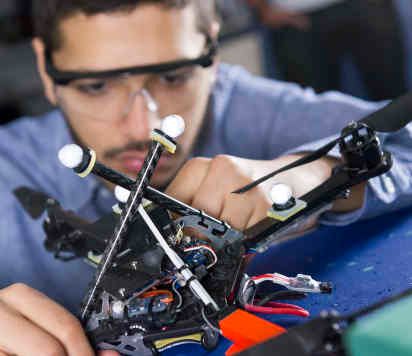
Computational fluid dynamics
Overview
Our Computational Fluid Dynamics (CFD) research focuses on development and application of tools to perform scale-resolving simulations of transient flow phenomena and turbulence. In particular, we focus on development of novel high-order discretisations for use on structured and unstructured grids, as well as their implementation for massively-parallel many-core architectures. We are also interested development of novel meshing methods.
Facilities
64-Core Intel server, 64-Core AMD server, 20-GPU Nvidia server. Access to Imperial College HPC facilities including CX1 and CX2. Access to UK HPC facilities, including Hector and Emerald.
Funding
A number of staff involved in CFD research hold prestigious grants including an EPSRC Early Career Fellowship, an EPSRC Platform Grant, a McLaren Racing/Royal Academy of Engineering Research Chair and the GungHo project (to develop a next-generation dynamical core for the UK Met Office weather and climate model).
Staff also played a significant role in establishing the Laminar Flow Control Centre at Imperial College via an EPSRC Programme grant, as well as the Imperial College British Heart Foundation Centre of Research Excellence. In the last five years staff involved in CFD research have obtained over £6.9m in funding.
Staff
Professor Yongyun Hwang
Professor Yongyun Hwang
Professor of Fluid Mechanics
Professor Sylvain Laizet
Professor Sylvain Laizet
Professor in Computational Fluid Mechanics
Emeritus Professor Michael A Leschziner FREng
Emeritus Professor Michael A Leschziner FREng
Emeritus Professor
Professor Rafael Palacios
Professor Rafael Palacios
Professor in Computational Aeroelasticity
Professor Joaquim Peiro
Professor Joaquim Peiro
Professor of Engineering Computation
Professor Spencer J Sherwin FREng
Professor Spencer J Sherwin FREng
Head of the Department of Aeronautics
Professor Peter E Vincent
Professor Peter E Vincent
Professor of Computational Fluid Dynamics
Computational structural mechanics
Overview
Our research is focused on different aspects of materials, structural mechanics and dynamics. New meshfree techniques have also been developed by the group for crack growth modelling, shells and composites.
Funding
Development of new boundary element formulations on structural acoustics and noise control 3.1M€ EU project SEAT(AST5-CT 030958) led by the group, large deformation and post buckling (Aliabadi and Baiz) help to maintain the group at the forefront of the research in BEM. Major recent grants include FP 7 L2 project SARISTU (1.0MEuros Aliabadi, Robinson)) and JTI CleanSky projects (totally 950KEuros Aliabadi) for research related to developing FEM and BEM Structural Health Monitoring methodologies for detecting impact damage in large scale aerospace composite panels.
Staff
Professor Ferri Aliabadi
Professor Ferri Aliabadi
Chair in Aerostructures
Professor Silvestre T Pinho
Professor Silvestre T Pinho
Professor in the Mechanics of Composites
Dr Vito Tagarielli
Dr Vito Tagarielli
Associate Professor in Mechanics of Solids
Optimisation and control
Overview
Our research is focused on the optimal design and control of cyber-physical systems, where physical systems affect computations and vice versa. This tight integration allows one to design systems with functionalities that are impossible by physical design alone. Applications include the attenuation of unsteady forces on large and lightweight aerostructures, skin friction drag reduction, combustion and morphing structures.
We have developed efficient numerical methods and computer architectures that are orders of magnitude faster and more energy efficient, compared to previous solutions, for implementing various advanced control, estimation and decision algorithms in real-time embedded systems. We also have on-going research into novel methods for the automatic synthesis of low-order models for control, estimation and simulation.
Funding
Our industrial collaborators include EADS, ONERA, VKI, LMS, National Instruments and Siemens. Aeronautics lead the 4.5M€ FP7 project Embedded Optimisation for Resource Constrained Platforms (EMBOCON) [http://embocon.org]. We are also partners in the Aerospace Multidisciplinarity Enabling Design Optimisation (AMEDEO) [http://www.amedeo-itn.eu] and Training for Embedded Predictive Control and Optimization (TEMPO) [http://www.itk.ntnu.no/tempo] Marie Curie Initial Training Networks.
Staff
Professor Robert W Hewson
Professor Robert W Hewson
Professor of Multidisciplinary Design Optimisation
Professor Eric C Kerrigan
Professor Eric C Kerrigan
Professor of Control and Optimization
Dr Thulasi Mylvaganam
Dr Thulasi Mylvaganam
Associate Professor in Control Engineering
Professor Rafael Palacios
Professor Rafael Palacios
Professor in Computational Aeroelasticity
Professor Matthew Santer
Professor Matthew Santer
Professor of Aerospace Structures


